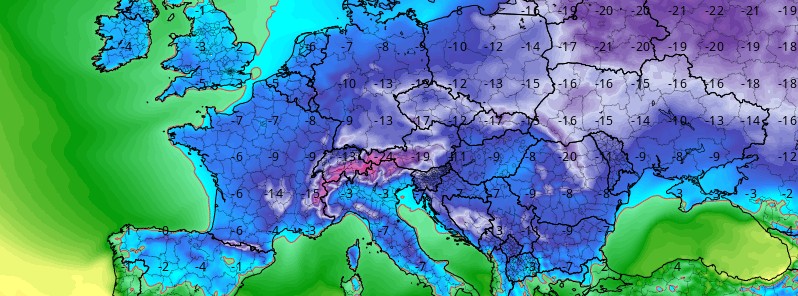Severe Arctic blast affecting Europe at its peak

At least 11 people have been found frozen to death across Europe over the past couple of days as very cold Arctic air engulfed the continent. This event is its peak today and is currently producing below freezing daytime temperatures across entire Europe except for Portugal and southern Spain. February 28 will remain below freezing but warm African air is already heading north and is expected to warm up the region in the days ahead. The temperatures in March, however, are expected to remain below average.
Emergency shelters across Europe are full as daytime temperatures dropped way below freezing and in many areas turned record-breaking for this time of year. Add powerful, bone-chilling winds to this and you have a recipe for freezing disaster, just days before the start of meteorological spring.
Rome woke up Monday, February 26 covered in snow for the first time in six years in what authorities described the largest snowstorm to hit the city at the end of February in decades. Temperatures in this Mediterranean city dropped to -4 °C (24 °F) and combined with rare snow to disrupt the traffic and close schools and tourist attractions.
The first measurable snow since 2012 reached many areas of southern Croatia on Monday too. Although 5 – 10 cm (2 – 4 inches) of snow means nothing for any northern region, that amount accumulating in the south is enough to cause complete traffic collapse. Due to record-breaking snow for this time of year and with wind gusts to 180 km/h (112 mph), heavy traffic in Croatia's mountainous region was brought to a standstill, effectively cutting off Istria and Dalmatia from the rest of the country. Drivers were urged to stay off the highways until conditions improve by the end of the week. At least two people are in critical condition and 14 were injured after a head-on collision of a truck and a bus in this region.
Berlin's emergency shelters for homeless were 95% full yesterday as temperatures dropped to -20 °C (-4 °F), raising fears of overcrowding in the nights ahead.
The cold snap in Sweden coincided with schools' winter sports break, with temperatures ranging from -5 °C (23 °F) in Stockholm to -20 °C (-4 °F) in the mountains near Ostersund.
Chrome and copper miners in northern Albania have not been able to go to work after heavy snow blocked mines, the AP reports. Some areas are under 2.5 meters (8.2 feet) of snow, making some national roads impassable. Strong winds have also damaged power plants, causing blackouts mainly in rural areas, while many schools in the countryside were closed or held with reduced classes.
This winter's record low temperatures have claimed the lives of at least 3 people over the weekend in Vilnius, the capital of Lithuania. Their Hydrometeorological Service said temperatures plunged as low as -24 °C (-11 °F) in the central Lithuanian town of Ukmerge both Sunday and Monday.
Brutally cold temperatures were registered in neighboring Russia too, with its meteorological service warning of "abnormally cold" temperatures of between -14 °C (6.8 °F) during the day and -24 °C (11.2 °F) overnight.
The coldest temperature yesterday was registered at Dolina Campoluzzo (altitude 1 768 m / 5 800 feet), North Italy, at -40 ° C / ° F.
At least 11 homeless people have been found frozen to death over the past three days in Europe but keep in mind that this is a low estimate and the actual number is probably much higher. Of that confirmed number, at least 8 have died in Poland, bringing the death toll since November 1 to 48.
The blast is at its peak today and is currently affecting entire Europe except for Portugal and southern Spain. Those two countries will be the first to warm up on February 28 and March 1, followed by France, Germany, central Italy, western Croatia and entire southeastern Europe on March 2.
While this warming trend is expected to continue over the next 10 days, the temperatures in March are expected to continue below average.
Featured image: 2-m air temperature at 06:00 UTC, February 27, 2018. Credit: GFS, TropicalTidbits

Commenting rules and guidelines
We value the thoughts and opinions of our readers and welcome healthy discussions on our website. In order to maintain a respectful and positive community, we ask that all commenters follow these rules:
We reserve the right to remove any comments that violate these rules. By commenting on our website, you agree to abide by these guidelines. Thank you for helping to create a positive and welcoming environment for all.